Robin Dee Hale of Gainesville, Georgia passed on October 1, 2021. He is survived by his brothers Joel and Jimmy, his sister-in-law Debra, and many nieces and nephews. He was preceded in death by his parents John and Hazel Hale, a sister Laura, and a brother, Sam.
One of North Georgia’s most beloved actors, Robin performed for more than 30 years with companies including the Gainesville Theatre Alliance, Georgia Shakespeare Festival, Horizon Theatre and Brenau Playmakers. His extraordinary body of work included leading roles in dozens of plays such as Foxfire, A Streetcar Named Desire and Look Homeward Angel. His performance in GTA‘s The Scarlet Pimpernel was showcased at the Kennedy Center in 1990.

For all his remarkable work as a theater artist, Robin is best known to so many as a “dear friend.” He will be terribly missed, but his life‘s impact will live long in the hearts of this community.
From Shawna McKellar:

I’ve been working on this small theater portion of Robin Hale’s obituary for a while now, but with the news of his passing last night, I feel that I need to approach this writing a little differently. Odd how knowing that the inevitable, but unthinkable, has actually happened makes the energy in one’s synopses bounce around in new ways, illuminating different memories.
During the 42 years I knew Robin, he told me many, many stories from his childhood. The vast majority of which were hilarious. Robin was always a theatrical person. In the first grade, tired of his mother’s mediocre breakfasts, Robin decided to quit school. He told his teacher his father had been transferred and they were moving away over the weekend. His teacher and his fellow students threw him a going away party. Later, she even called Robin’s mother to say how sad she was that he was leaving. Imagine both women’s surprise when they learned the truth. When he was in sixth grade he was in his elementary school’s production of an opera. That teacher remained a hero to Robin the rest of his life. Starting as a young high school graduate, he was in numerous productions in and around Atlanta, including A Streetcar Named Desire, as Stanley Kowalski.
Over the years, Robin was in countless plays with the Gainesville Theater Alliance and Wonder Quest, including Della’s Diner, The Scarlet Pimpernel, J. B., The Imaginary Invalid, The Wizard of Oz, Fiddler on the Roof, Servant of Two Masters, and Look Homeward Angel. He directed No Exit, and The Laramie Project. I’m sure I’m missing many of his Gainesville productions. He also acted in Atlanta in the Horizon Theater production of Prelude to a Kiss and in several plays with the Georgia Shakespeare Festival. He was greatly loved and appreciated by everyone who worked with him.
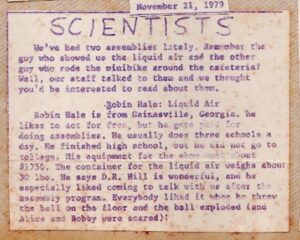
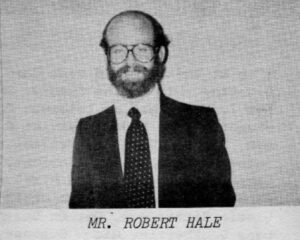
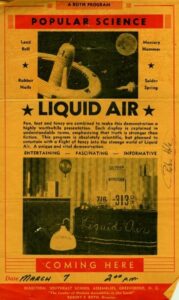
When I first met Robin, he was traveling around in a VW Van performing as “Mr. Science” in school auditoriums across the Southeast. In 1979, I first saw Robin perform as Mr. Science at he and Stoney’s (my late husband) yearly Halloween party. It was a performance that was more PG rated than what he usually did – involving a hotdog and liquid nitrogen. Still, he approached the role with a flamboyance, joy and mischief that delighted his adult audience as much, I’m sure, as his child audiences.
Unfortunately, the old van wasn’t long for this world, Robin had incredibly bad luck with his vehicles. Once he lost the van somewhere in north Atlanta after getting so stoned, he could neither remember how he got back to Gainesville or which suburban parking lot he’d left the van. After much sleuthing and coffee, we were able to help Robin scrape enough memories together to relocate the van. Months later, while on the road as Mr. Science, the van broke down on the side of the road. When he came back to it with the part he needed, he found every window shattered. He had no choice but to drive home in the freezing rain, with no windshield. Later, he shocked Stoney and I by walking in the door with teeth chattering and icicles in his beard. I think the old van passed soon after that incidence.
Soon, I was lucky enough to share the stage with Robin in Gainesville Children’s Theater production of The Diary of Anne Frank. Our dear friend, Susan Wilber played Mrs. Frank, I played Mrs. Van Daan and Robin played Mr. Dussel; it was directed by Ed Cabell. Atlanta actor, Chris Curran, was Otto Frank and Lisa Jones Dobbs played Anne. Megan Mulkey, Bill Jones and Jim Hammond rounded out the cast. If you will recall, Robin’s character, Mr. Dussel is the stodgy dentist who comes to the Franks’ attic hiding place rather late in the story. He is a nervous, fastidious, awkward character who is perpetually irritated with Anne and Peter. He is forced to sleep on a small cot in Anne’s little corner of the attic, which both characters abhorred. As Mr. Dussel, Robin, didn’t hesitate to reveal a curmudgeonly side. As was not unusual, Robin’s inhabitance of the misogynist also had an awkward, bumbling quality that made him somewhat comical. We performed daily, sometimes more than once, for school children at the new Georgia Mountain Center. Our auditorium was always full of chatty, excited middle and high schoolers, but middle school children were the toughest audiences.
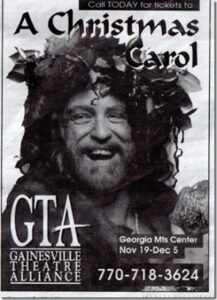
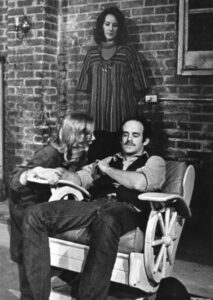

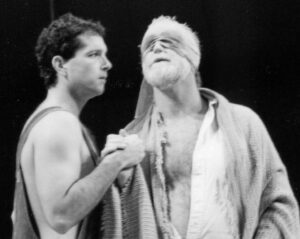
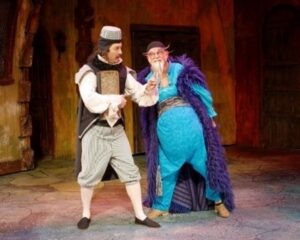
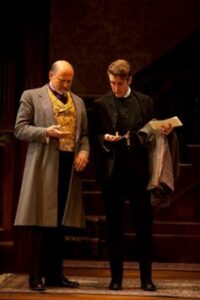
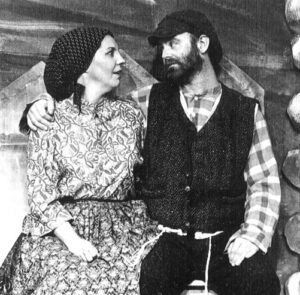
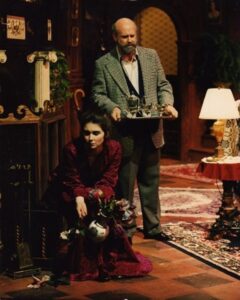
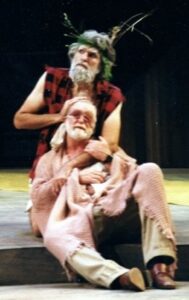
Our toughest preadolescent audience, however, was from a poor, primarily Black middle school in Hall County. In 1979, I suppose it’s safe to say, the details of desegregation were still being worked out. Don’t get me wrong, these children were excited to be there, but we actors weren’t prepared for their comments from the house. When Mrs. Frank went to the cupboard to bring out an unsliced loaf of bread, a child rang out with, “That ain’t no real bread!” The truth of which we could not deny.
But later in the play, when Robin as Mr. Dussel approached Anne to quieten her nightmare screams, a child loudly called out from the dark theater, “Get you some Mr. Dussel!” Instantly understanding the implications of the comment, Robin froze on the spot. From offstage, we could see that he was quickly calculating whether it was more appropriate to continue his journey to the Holocaust martyr’s bed, or to just call to her from where he was frozen. The children laughed and screamed uproariously, while Robin quickly resumed his character’s pursuit of shushing Anne at her bedside. We, his cast-mates, lived that moment of indecision with him. While the entire cast laughed about it afterwards, Robin prodded us to wonder about the possible implications of this heckler’s words. “What sort of homelife must this child have?” While theater aspires to promote empathy and human understanding in its audiences, many times it can do the same for its actors. Of all the lessons I learned from Robin, his spiritual understanding of the responsibilities and covenants between actors and audience will always be one of my most cherished.
In 1993, I was lucky enough to share the stage with Robin again, many years later in Sautee Nacoochee, Georgia. We were in Lanford Wilson’s The Mound Builders, directed by another friend, Scott Simpson. By then, both of us had acquired years of experience on stage. This production of The Mound Builders was the first time I had been on stage since the death of my young husband. I was thankful to have Robin there with me, as he had been during all the major events of my life. Although Robin was only eight years older, he was the philosophical, spiritual, brother-guide at every juncture of my adult life. Fittingly, he played my brother in The Mound Builders. He had to carry me on stage, which I now see as somewhat of a metaphor for our relationship.
From Grant Chapman:

This is a picture of Robin Hale as I remember him, when he was my acting teacher at Firespark drama camp sometime in the late 90s. I was around 12; I did not know he was the teacher I needed, or the lessons he was teaching me at that perilous age just by being himself. After I grew up slightly and Robin and I became Facebook friends, I learned he was not only an actor with a long career in the Atlanta theater, but also that he was a gay man, he was HIV-positive, and he was primary caregiver for his mother and brother. We exchanged messages about Tennessee Williams, teaching, opera, and Atlanta’s bathhouses of yesteryear. He had an extraordinary mind, an encyclopedic knowledge of literature and architecture, and could quote liberally from Virginia Woolf’s diaries. He wrote prose of great depth and beauty about his daily life, nature, and art. Robin practiced gratitude profoundly, and shared it often; his posts were a glimpse into a life lived deeply and honestly, and he did not omit the sufferings of illness, poverty, loss, and aging. I feel so fortunate to have become reacquainted with him through this medium, though I never saw him again in person after that camp summer, when he directed me as Peter Quince in A Midsummer Night’s Dream, my first Shakespeare play ever. Robin shared his death on Facebook just as he shared his life, letting us all know he was on the way out, and making it clear that he was ready. No grace seemed inaccessible to this man. I hope I can carry on some part of him. Thank you, dear Robin. Pass safely to the other shore.
From Cristin Kelly Jovicic
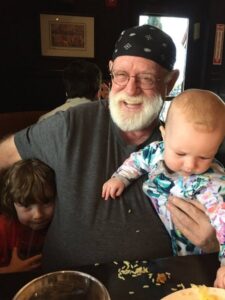 |
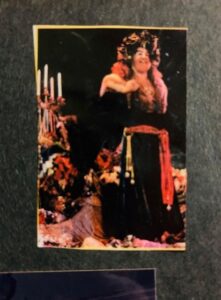 |
||
I almost gave up on the book I’m reading (“Still Life” by Sarah Winman) because it was a slow starter. Thankfully, I didn’t. It’s a novel about long-term, intergenerational friendships that remain vital, despite absences of years and miles. Friendships based on shared loves of the arts and culture.
I am blessed to be able to relate.
Last night, I highlighted this quote, which is said after a young character describes a regular city scene with a beautiful depth and humanity:
“Oh, my dear Miss Skinner, there is no turning back. You shall die with those lights in your eyes. Miss Skinner has turned looking into loving! The first rule of art. Looking into loving!”
I wish I could share this story and this quote with our dear Robin, who I am certain died with “those lights” in his eyes.
To know Robin was to bask in the warmth of his generous, genuine kindness. He didn’t do platitudes or cliches That’s what made his friendship profound. Why so many of his friends will tell you that we were “lucky” to have known him. Every day, he “turned looking into loving.”
Once, before I knew him well, he found me crying on the loading dock after we closed A Christmas Carol. I was 20, and felt juvenile and silly being caught sobbing by a professional, but he just hugged me and told me I’d “done good.” It wasn’t so much the words that healed me, but the fact that I knew he meant it.
Living so far away, I only saw him a couple of times over the past decade, but every minute of those visits was true love. He rejoiced in my girls, and bathed us all in his smiles, laughter, and deep interest.
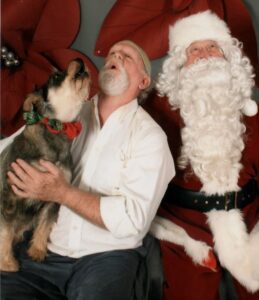
I never felt far from him because he used Facebook as it ought to be used – a place where he built community, kept his friends close, and made us notice things more keenly. He elevated us with his storytelling on everything from architecture to literature to a flower in his yard. His walks up and down the block with his sweet dog Emma brought the musings of a poet.
“Looking into loving.”
There will never be another person like Robin in my life (and please know that I would never disservice him with banality – I mean this literally).
I’m casting out love to our many mutual friends who are both grieving and rejoicing in our great fortune today. To Darryl Konig Don, thank you sincerely for loving him so deeply and for letting us be with Robin until the end.
Friends, I hope in honor of Robin Hale, you’ll look for ways to turn looking into loving.
Robin, precious friend – you are the feast.
From Mary Elizabeth:
- H. Auden writes:
“Stop all the clocks. Cut off the telephone.
Prevent the dog from barking with a juicy bone….”
This is my favorite poem – it was written about a beloved friend who had just died.
When I found out that my beloved friend Robin Hale had passed today, it was the first thing that came to mind. The poem is a bit more morbid than Robin would like for me to feel. So – I won’t post it all.
You see- pretty much everyone who knew Robin called him “A Light,” and he truly was. He was the epitome of lightness. He took hardships and difficult situations and effortlessly made them palpable. He was funny. Like brilliantly funny. He taught me about self-worth and he taught me how to be a better and gracious person. I will miss him so much.
So just today I agree with the dark and sad Auden.
“The stars are not wanted now: put out every one; Pack up the moon and dismantle the sun…”
And tomorrow we should all think of how we can make someone else’s life better. Pet a sweet dog. Or make someone laugh. Because that’s what Robin Hale did every day of his life.
I will miss him forever. (I do hope he finds a way to haunt me.)
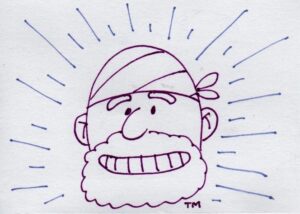
From Amy Elizabeth Sweeney

My friend and teacher Robin Hale has passed away. He was never technically my teacher, but he taught me so much about humanity and the love of all art forms. I was blessed enough to be onstage with him when I was in college. He was Christmas Present and I was Christmas Past…suited us really. He was of the moment and I would dwell, but there was love. He has finally gone on to that standing ovation in the stars. Love you, sir. Be at peace and enjoy your homecoming.
What Are Years?
Marianne Moore
What is our innocence,
what is our guilt? All are
naked, none is safe. And whence
is courage: the unanswered question,
the resolute doubt, —
dumbly calling, deafly listening—that
in misfortune, even death,
encourage others
and in its defeat, stirs
the soul to be strong? He
sees deep and is glad, who
accedes to mortality
and in his imprisonment rises
upon himself as
the sea in a chasm, struggling to be
free and unable to be,
in its surrendering
finds its continuing.
So he who strongly feels,
behaves. The very bird,
grown taller as he sings, steels
his form straight up. Though he is captive,
his mighty singing
says, satisfaction is a lowly
thing, how pure a thing is joy.
This is mortality,
this is eternity.
Such a wonderful actor and person. He enriched the lives of so many persons. I heard there might be a memorial done on Zoom. Is that so? I would love to participate.
I heard about Robin’s passing with unbelievable sadness. I first met Robin in the fall of 1977, when I began a two-year stint as head of the theater program at Brenau. He appeared in several of the plays I directed, and he was easily one of the best actors I’ve ever worked with–as good as anyone who performs on Broadway or in major films. I’ve often thought of him as similar to John Malkovich in his subtlety and finesse, as capable as Malkovich of being sly and mischievous and even sinister. But Robin was always a lot handsomer than Malkovich, and he was capable of a warmth and heartiness I’ve never seen Malkovich exhibit in anything he’s ever done. I know that this is because Robin himself was incredibly warm and generous and kind. (I have no idea how Malkovich is on this point.) North Georgia was certainly lucky to have Robin stick around and share his talents with his local community instead of heading to New York or California to pursue a high-flown career. Robin and I were only fitfully in touch after my professional interests shifted and I left Georgia. But he was in some way the beating heart of my time there. I loved him very much, and as a farewell to him, I think of the closing lines of A Midsummer Night’s Dream, which I directed at Brenau, and in which Robin (beautifully and appropriately) played Puck–a.k.a. “Robin Goodfellow.” These closing lines were spoken by Robin: “Give me your hands if we be friends, and Robin will restore amends.” The debts are all ours, Robin . . . .